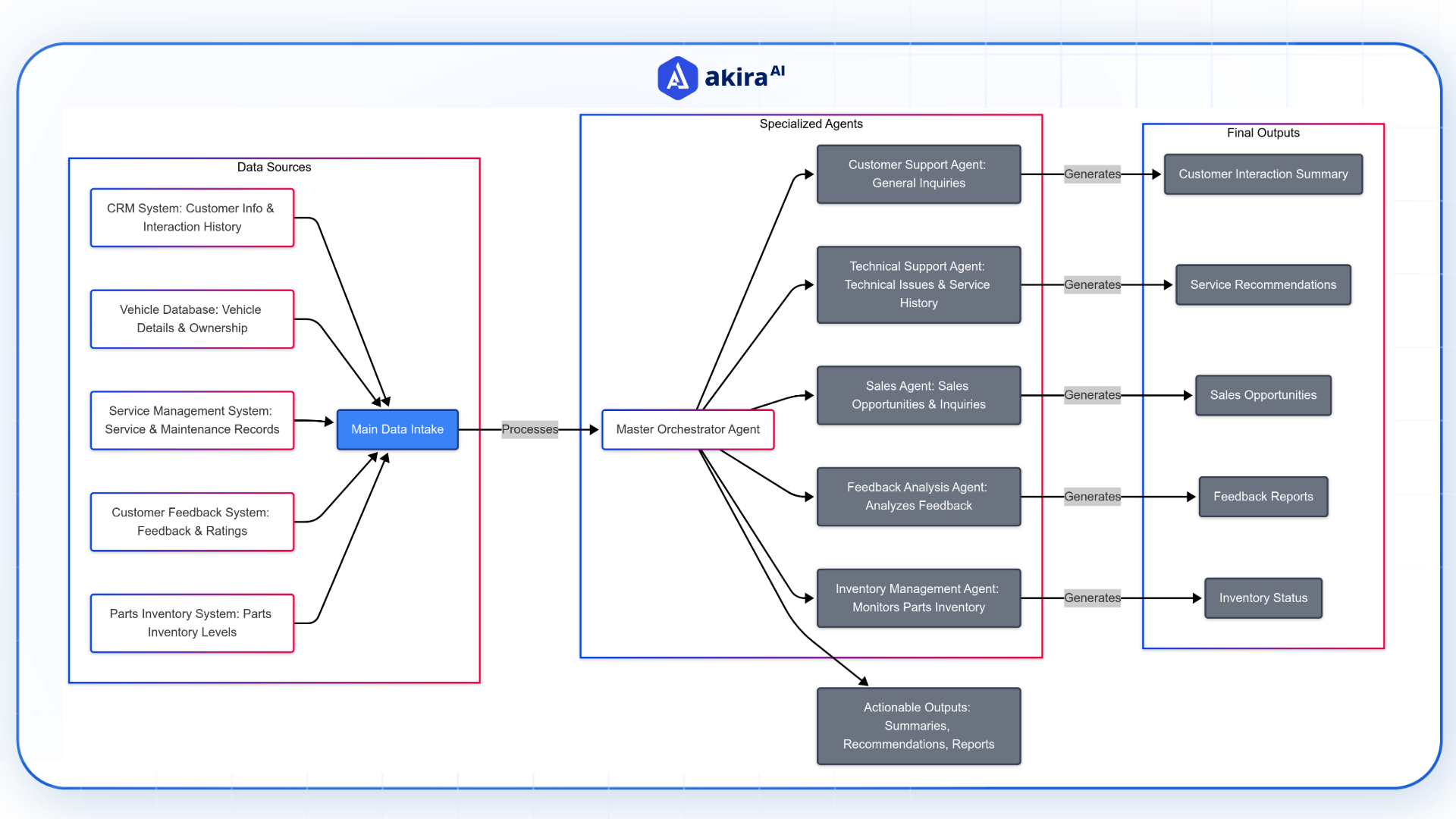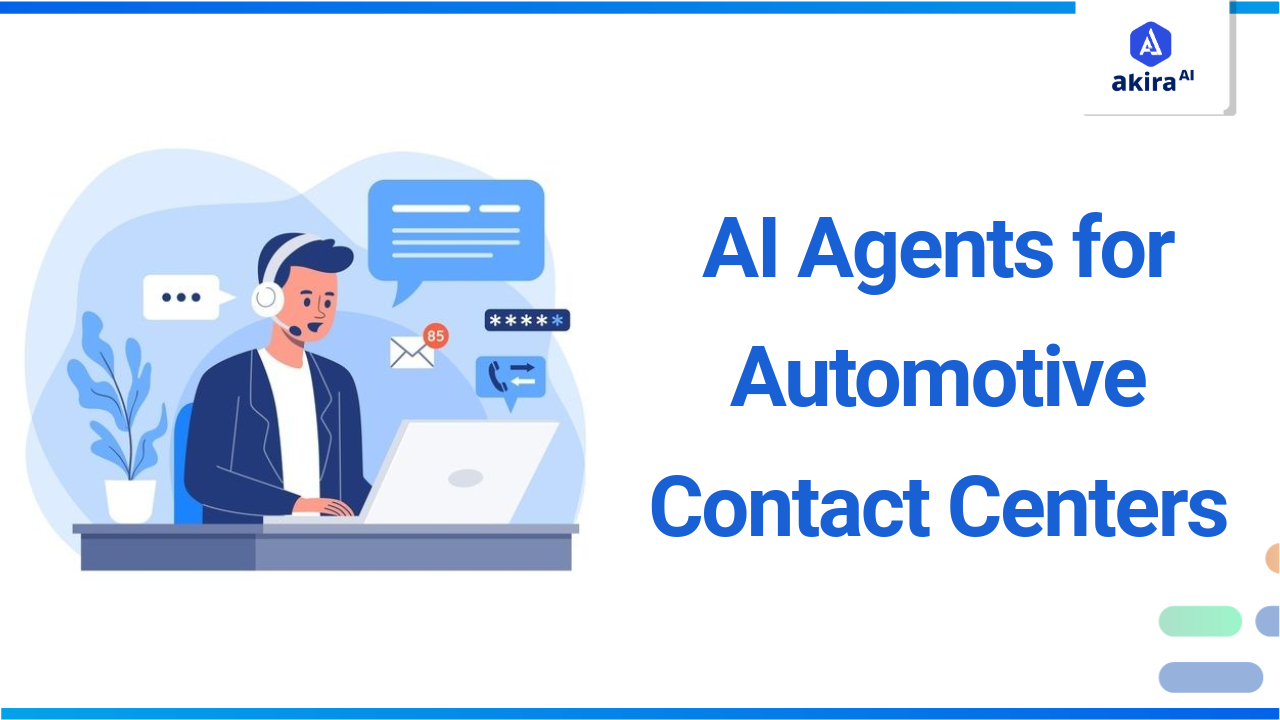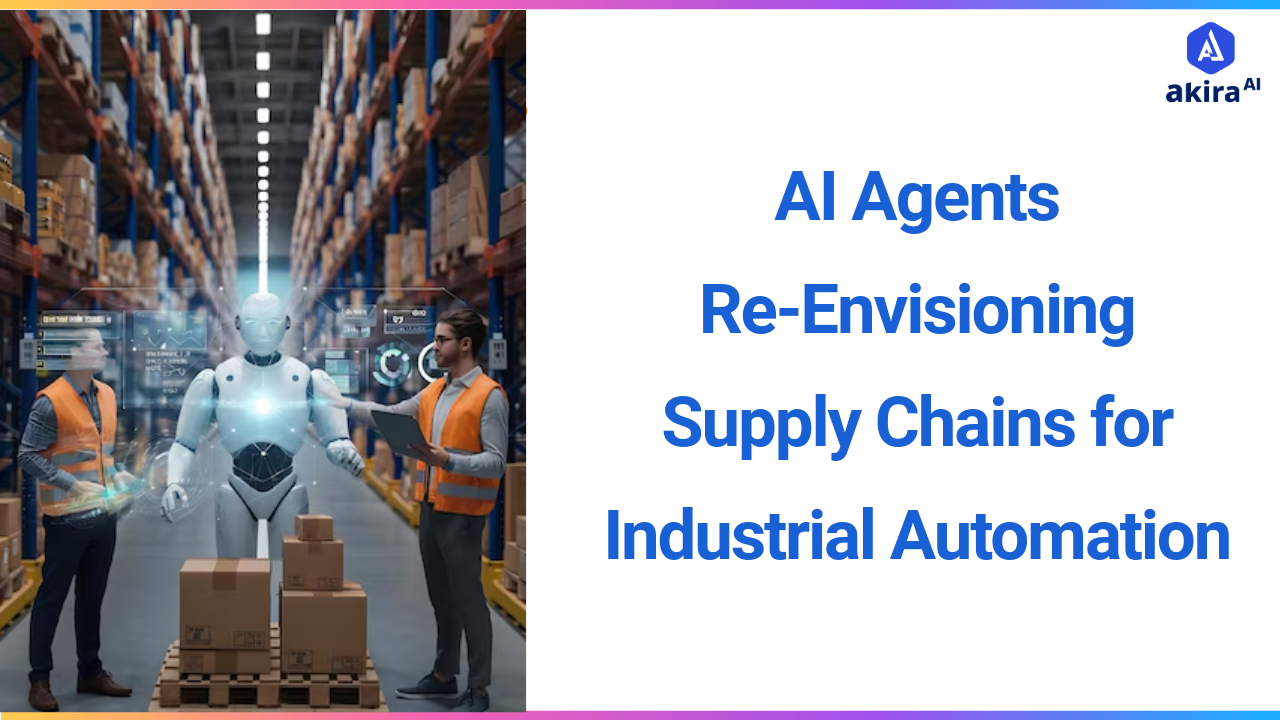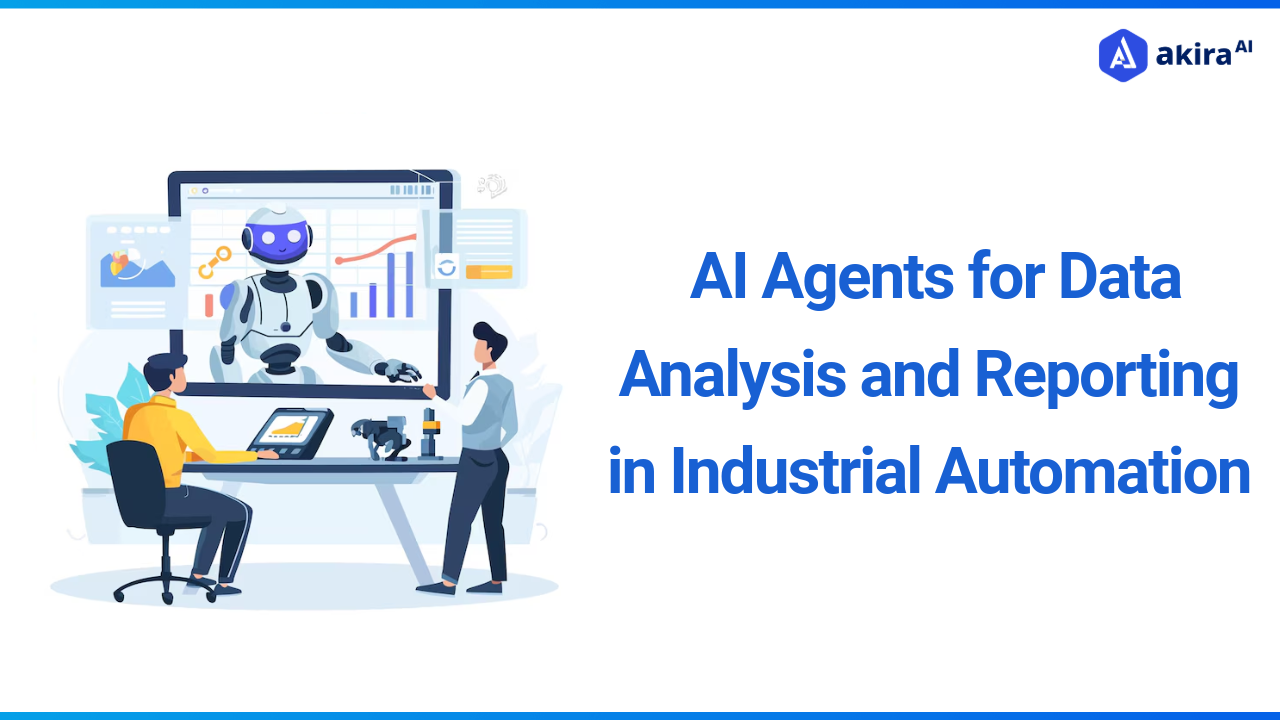Key Insights
-
Automate inquiries, predictive maintenance, and call routing, reducing wait times and operational costs.
-
Provide 24/7 support, sentiment analysis, and personalized interactions for improved customer satisfaction.
-
Enable predictive analytics and automation, making contact centres proactive and data-driven.

A global automotive company was facing a surge in customer service demands, with increasing call volumes and inconsistent resolutions. Customers frequently encountered long wait times, and agents struggled to manage inquiries efficiently. The company knew it needed a more innovative solution to stay competitive.
By implementing AI agents, the business revolutionized its contact centre operations. Automated support reduced wait times, predictive maintenance prevented breakdowns, and intelligent call routing instantly ensured customers got the proper assistance.
This transformation not only enhanced customer satisfaction but also streamlined operations. In this blog, we explore how AI agents are redefining automotive contact centres for the future.
What are Automotive Contact Centers?
Automotive contact centres are specialized customer service hubs that handle automotive businesses' inquiries, support requests, and service appointments. These centres serve as a communication bridge between car manufacturers, dealerships, service providers, and customers, offering assistance through phone, email, chat, and digital platforms.
They manage various tasks, including vehicle inquiries, roadside assistance, warranty claims, service scheduling, and financing support. By integrating AI and automation, modern automotive contact centres enhance customer experiences by providing quick responses, predictive issue resolution, and personalized interactions.
By streamlining communication, these centres improve efficiency, customer satisfaction, and brand loyalty in the automotive industry.
Key Concepts of Automative Contact Centers
Omnichannel Support: Ensures seamless customer interactions across phone, chat, email, and social media for efficient communication.
AI & Automation: Uses chatbots and automated workflows to handle inquiries, service bookings, and issue resolution faster.
Customer Relationship Management (CRM): Tracks customer history and preferences to deliver personalized and efficient support.
Service & Maintenance Coordination: Manages service appointments, roadside assistance, and warranty claims for smooth operations.
Data Analytics & Insights: Analyzes customer data to enhance service quality, predict trends, and improve customer satisfaction.
Traditional Way of Managing Automotive Contact Centers
Before AI agents, automotive contact centres heavily relied on human agents to handle all customer queries. This traditional approach had several limitations:
-
Manual Data Handling: Agents manually entered and retrieved customer data, increasing the chances of errors and slowing down response times. This inefficiency led to delays in addressing customer inquiries and service requests.
-
Limited Accessibility: Customer support was only available during business hours, making it difficult for customers to get assistance during emergencies or off-hours. This restriction resulted in longer wait times and frustration for customers needing urgent help.
-
High Costs: Maintaining a large team of human agents to handle customer inquiries required significant financial resources. Training, salaries, and infrastructure costs made scalability difficult, especially during peak demand.
-
Inconsistent Customer Experiences: Service quality varied based on the agent’s knowledge, skills, and approach, leading to inconsistent customer interactions. Some customers received quick and accurate support, while others faced delays and miscommunication.
Impact on Customers Due to Traditional Ways
Traditional methods of managing automotive contact centres led to several customer satisfaction issues:
-
Long Hold Times: Customers often faced long wait times, especially during peak hours, which frustrated them and negatively impacted their experience.
-
Incomplete Information: Errors in manual data entry or retrieval could lead to incorrect or incomplete responses, causing customer confusion and dissatisfaction.
-
Generic Interactions: Human agents could not offer personalized solutions due to scripted responses, making interactions feel impersonal and frustrating.
-
Inflexible Support: Customers had limited access to support outside of business hours, with some being forced to wait for a callback.
Akira AI: Multi-Agents in Action
AI agents are designed to analyze customer interactions at multiple levels, ensuring that each query is addressed with the most relevant and efficient response. Here's an in-depth explanation of the solution and its components:

Fig1: Architecture Diagram of Automative Contact Center
-
Centralized Data Integration (Master Orchestrator Agent): This agent gathers data from multiple sources like CRM, vehicle databases, and service records. It ensures all specialized agents have access to accurate and up-to-date information. This allows for seamless coordination and efficient customer interactions.
-
Automated Customer Support & Inquiry Handling (Customer Support Agent): This agent retrieves relevant customer and vehicle details from the CRM system. It instantly responds to common queries, reducing the need for human intervention. By accessing historical interactions, it ensures personalized and efficient support.
-
Intelligent Technical Assistance & Troubleshooting (Technical Support Agent): This agent analyzes service history, diagnostics, and real-time vehicle data to identify potential issues. It provides accurate troubleshooting guidance, reducing resolution time and unnecessary service visits. If required, it escalates complex problems to human experts.
-
Sales & Service Opportunity Identification Agents: This agent leverages customer purchase history and vehicle information to identify new sales and service opportunities. It provides personalized recommendations on upgrades, accessories, or extended warranties. By using predictive analytics, it helps improve revenue generation.
-
Real-Time Feedback & Inventory Management Agents: The Feedback Analysis Agent analyzes customer reviews and ratings to detect service improvement areas. The Inventory Management Agent monitors parts availability and provides real-time updates to customer service teams. This ensures faster response times for maintenance and part replacement requests.
Prominent Technologies in the Space of Automotive Contact Centers
Several technologies are used in automotive contact centres, but each has its limitations:
-
Voice AI & Speech Recognition: Solutions like Amazon Alexa, Nuance Dragon, and Google Speech-to-Text enhance call handling by analyzing customer tone, intent, and keywords for improved interactions.
-
Augmented Reality (AR) for Remote Assistance: Platforms such as Microsoft HoloLens and TeamViewer AR enable virtual troubleshooting and vehicle diagnostics, reducing the need for physical service visits.
-
Blockchain for Secure Transactions: Technologies like IBM Blockchain, Ethereum, and Hyperledger Fabric provide secure and transparent interactions, ensuring data integrity in customer communications and payments.
-
IoT-Integrated Support Systems: Systems such as Bosch IoT Suite, AWS IoT, Cisco IoT Cloud, and ServiceNow IoT connect vehicles to contact centres for real-time diagnostics and proactive support, reducing service disruptions.
-
Automated ITSM & Workflow Management: Tools like ServiceNow ITSM streamline customer support operations by automating ticketing, incident resolution, and workflow management for a seamless customer experience.
How AI Agents Supersede Other Technologies
AI agents surpass traditional technologies by integrating more sophisticated capabilities, offering a more cohesive and intelligent solution:
-
Predictive Vehicle Maintenance: AI Teammates will analyze vehicle data in real-time to detect potential issues early, enabling proactive servicing and reducing unexpected failures.
-
24/7 Intelligent Customer Support: Automated assistants will handle inquiries across multiple channels, providing seamless support and reducing response times.
-
Sentiment-Based Customer Interactions: AI agents will analyze voice tone and text sentiment, adjusting responses dynamically to enhance engagement and improve customer satisfaction.
-
Automated Service Scheduling: Intelligent systems will manage appointment bookings, optimize technician availability, and send proactive reminders, improving operational efficiency.
-
Smart Call Routing & Assistance: AI agents will instantly analyze incoming queries and direct customers to the best-suited representative or automated solution for faster and more accurate resolutions.
Successful Implementations of AI Agents in Automotive Contact Centers
Several leading automotive companies have successfully implemented AI agents to enhance their customer service operations:
-
ServiceNow Virtual Agent for Automated Support: Automotive companies use ServiceNow Virtual Agent to handle customer inquiries, automate ticket resolution, and provide instant responses, reducing agent workload and improving efficiency.
-
IBM Watson AI for Predictive Maintenance: Automakers integrate IBM Watson AI to analyze vehicle sensor data, predict potential failures, and proactively schedule maintenance, enhancing customer satisfaction and reducing downtime.
-
Google Dialogflow for Conversational AI: Leading automotive brands deploy Google Dialogflow chatbots to assist customers with vehicle troubleshooting, service appointments, and roadside assistance through natural language interactions.
-
AWS Contact Center Intelligence for Smart Routing: AI-powered AWS Contact Center Intelligence enables intelligent call routing, ensuring customers are connected with the right agent or automated system for quicker resolutions.
-
Microsoft Azure AI for Personalized Customer Support: Automotive companies leverage Microsoft Azure AI to analyze customer preferences and past interactions, offering personalized service recommendations and enhancing customer engagement.
Final Thoughts on Automative Contact Center
AI agents are revolutionizing automotive contact centres by offering intelligent, automated, and efficient customer service solutions. Powered by advanced technologies such as NLP, machine learning, and predictive analytics, these agents enhance customer satisfaction, reduce operational costs, and ensure seamless support across multiple channels. As AI agents continue to evolve, they are setting a new standard in customer service for the automotive industry.
Next Steps with AI Agents
Talk to our experts about implementing compound AI system, How Industries and different departments use Agentic Workflows and Decision Intelligence to Become Decision Centric. Utilizes AI to automate and optimize IT support and operations, improving efficiency and responsiveness.



